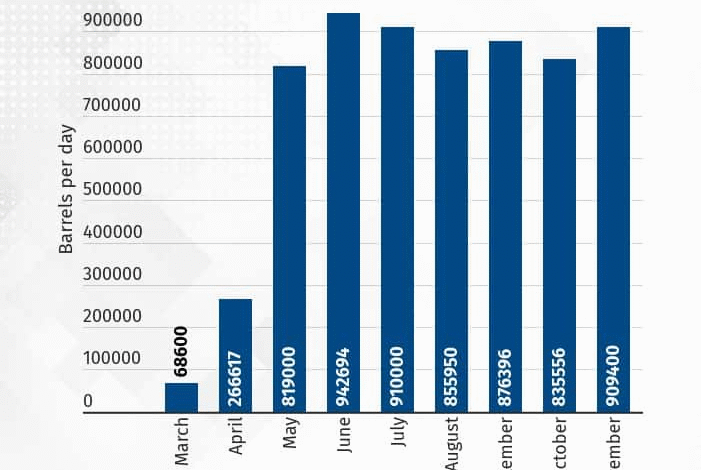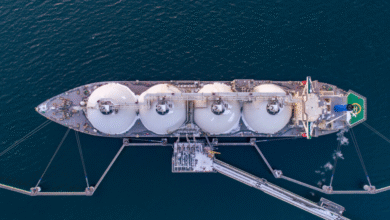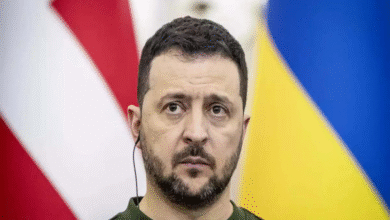India Russian Oil Purchases Spark Criticism from Trump Advisor

In recent times, India’s Russian oil purchases have become a focal point in international trade discussions, particularly amid the ongoing geopolitical tensions stemming from the Russia-Ukraine conflict. Criticism from U.S. officials, including former Trump advisor Peter Navarro, has spotlighted India’s decision to continue importing Russian crude despite global sanctions aimed at isolating Moscow. Navarro argues that such ‘opportunistic’ dealings jeopardize India’s aspirations as a reliable strategic partner of the United States. The backdrop of these accusations is a growing concern over the implications of India’s foreign policy choices and their impact on US-India trade relations. As global markets grapple with shifting alliances, India’s reliance on Russian oil marks a critical crossroads in international energy dynamics and diplomatic interactions.
India’s ongoing procurement of oil from Russia has raised significant concerns among international leaders, evoking discussions about the country’s foreign policy and its implications for global trade dynamics. As the world witnesses a realignment of energy supplies, particularly in light of the Russia-Ukraine conflict, India’s approach to Russian crude imports positions the nation in a complex web of negotiations and alliances. Peter Navarro, an advisor during the Trump administration, has labeled these energy transactions as ‘opportunistic,’ suggesting they conflict with India’s goal of becoming a strategic ally of the U.S. This scenario has far-reaching implications for US-India trade relations and highlights the intricate balance India seeks to maintain in its energy policy amid external pressures and criticism. As India navigates these waters, the future of its oil trade and overall international relations hangs in a delicate balance.
Peter Navarro’s Critique of India’s Oil Purchases
Peter Navarro, a former advisor to President Trump, has made headlines with his recent critique of India’s oil purchases from Russia. He argues that India’s ongoing procurement of Russian crude, especially amidst the Russia-Ukraine conflict, undermines global efforts to isolate Vladimir Putin and his economy. This contention draws attention to the ethical dimensions of international trade, particularly when energy resources are entwined with geopolitical tensions. According to Navarro, if India wishes to solidify its position as a strategic partner with the U.S., it must reassess its foreign policy and align more closely with American interests.
Furthermore, Navarro’s comments emphasize a broader context of U.S.-India trade relations that are under strain. As negotiations stall, the implications of India’s oil imports become more pronounced. Critics argue that India’s reliance on Russian oil not only affects its international image but could also trigger economic repercussions through potential sanctions or tariffs from the U.S. Such dynamics highlight the intricate balance India must maintain as it navigates relationships with both Russia and the United States, particularly in the face of increasing global scrutiny.
India’s Foreign Policy Amidst Global Tensions
India’s approach to foreign policy, especially regarding its oil imports from Russia, is influenced by a complex web of international relationships and domestic imperatives. The Ministry of External Affairs has stated that these imports stem from a need to secure affordable energy for Indian consumers, especially as traditional sources have been redirected due to the ongoing conflict in Europe. This situation raises questions about the rationale behind India’s strategic decisions in a time of heightened global economic volatility.
Amidst pressures from the United States and European Union, India defends its choices by asserting that the criticisms it faces are hypocritical, given that other nations simultaneously maintain trade ties with Russia. This reflects a core tenet of India’s foreign policy strategy — to preserve national interests while managing international expectations. As the geopolitical landscape continues to shift, India must carefully navigate its energy needs without jeopardizing its standing on the global stage.
Implications of Sanctions on India’s Oil Trade
The implications of U.S. sanctions on India’s oil trade with Russia cannot be understated. With the Trump administration threatening to increase tariffs coupled with the existing trade tensions, India finds itself at a crossroads. The additional 25% tariff on Russian crude imports could significantly impact India’s energy costs and overall economic stability. For a nation that heavily relies on energy imports to fuel its economic growth, these sanctions present a formidable challenge as they threaten to raise domestic prices and stymie economic progress.
In reaction to these sanctions, Indian officials have cited the necessity behind their imports, highlighting that the geopolitical landscape necessitates a pragmatic approach to secure energy needs. However, as they position themselves against U.S. pressures, questions linger regarding the long-term sustainability of these ties. If tariffs continue to escalate, India may have to reevaluate its energy procurement strategies while balancing its historical relationship with Russia against its ambitions of being a significant player in the global energy landscape.
The Russia-Ukraine Conflict and India’s Energy Needs
The ongoing Russia-Ukraine conflict has had profound effects on global energy markets, and India is feeling the brunt of these repercussions as it seeks to meet its energy demands. As traditional energy suppliers redirect their resources towards Europe, India has turned to Russia, which has emerged as a significant source of crude oil amidst rising prices and uncertainty. This shift, however, has drawn criticism from the United States, as India’s choices are viewed through the lens of international political dynamics.
The need for continued oil imports from Russia reflects not just a short-term strategy, but an urgent necessity to ensure energy security for India’s growing economy. This scenario raises important discussions around energy independence and the motivations driving foreign policy decisions, especially for a nation that has long prioritized strategic autonomy. As India must tread carefully and balance these needs against international pressures, the outcome of its energy strategy will likely influence its long-term diplomatic relationships.
Trade Relations Between the U.S. and India
The recent tension in U.S.-India trade relations has come into sharp focus as India continues its oil purchases from Russia. The cancellation of trade negotiations has intensified discussions around how India’s dependence on Russian crude might affect overall trade dynamics with the United States. Historically, the U.S. and India have fostered close ties; however, Navarro’s criticisms signal a potential pivot in how the U.S. perceives India’s strategic decisions and its commitment to align with Western policies.
For India, the challenge lies in balancing its economic needs against the backdrop of U.S. expectations. As they seek to expand their partnership with the U.S., trade relations may suffer unless India can effectively negotiate the complexities of international scrutiny over its energy acquisitions. It remains to be seen how this evolving landscape will shape the trade dialogue, but ongoing developments suggest that a recalibration is necessary for both nations going forward.
Domestic Political Ramifications of Oil Imports
India’s purchase of Russian oil has important domestic political ramifications. As the government justifies these imports on grounds of necessity, dissenting voices argue that such policies undermine India’s global standing. Politically, this could become a contentious issue, particularly in light of increasing pressure from opposition parties that may use the situation to challenge the ruling government’s foreign policy decisions. As domestic energy costs rise, public sentiment may shift, placing further pressure on policymakers to reconsider their stance on Russian crude imports.
Additionally, the political climate in India necessitates that leaders maintain a favorable relationship with Russia, given their long-standing historical ties. Any perceived capitulation to U.S. demands could attract backlash from sections of the Indian electorate who value global non-alignment. Therefore, navigating this intricate balance becomes a challenging task for Indian policymakers, as they must sustain domestic support while managing international relations amidst geopolitical tensions.
India’s Energy Imports vs. Global Criticism
While India continues to import oil from Russia, the criticism it faces from Western nations has raised pertinent questions about justifications for its energy strategy. Critics argue that by procuring Russian crude, India is indirectly supporting Putin’s war efforts. In response, India underscores that its oil purchases are driven by necessity, aimed at ensuring energy security for its population in the face of shifting global markets. The country’s officials point to paradoxes inherent in the criticisms, noting that several nations continue to engage in trade with Russia, contradicting the calls for complete sanctions.
This scenario brings into light the complexities inherent in energy diplomacy where national interests often clash with international expectations. As India negotiates its path forward, the balance between economic necessity and geopolitical alignment will be scrutinized. The future of India’s energy imports could play a critical role in shaping its relationships, particularly with the U.S., where expectations of alignment with Western values are greater than ever.
Consequences of Rising Tariffs on Energy Trade
The imposition of rising tariffs on energy trade, particularly with regard to Indian imports of Russian oil, poses significant economic consequences for the country. As the U.S. increases its tariff rates, the overall cost of energy for Indian consumers could see a dramatic rise, which directly impacts the economy. With India being one of the largest oil importers, any increase in procurement costs could place additional strain on domestic energy markets and inflation levels.
Moreover, the economic implications of such tariffs could force India to reconsider its oil sourcing strategy. Faced with the dual pressure of rising costs and political demands from the U.S., India may explore alternative sources to mitigate the financial impact. Yet, the challenge lies in transitioning away from Russian crude oil without compromising energy security, indicating that India’s energy strategy needs to be both pragmatic and politically astute in navigating these challenges.
The Impact of Global Energy Policy on India
India’s approach to its energy imports is also shaped by broader global energy policies, particularly those established by Western nations in response to the Russia-Ukraine conflict. The G7 nations, along with Australia and the EU, have sought to impose restrictions on Russian oil trade to diminish its economic power. The success of these price caps serves not only to influence global market dynamics but also to place additional pressure on nations that continue to engage with Russia, such as India.
For India, adapting to these policies requires dexterous diplomacy to ensure stable energy supplies while navigating international criticisms. As global energy markets change and fluctuate, the ability of Indian officials to maintain a steady flow of affordable oil, while also addressing international concerns, will be paramount. This balancing act illustrates the impact of global energy policies not only on India’s energy security but also on its diplomatic relations across the board.
Frequently Asked Questions
How do India Russian oil purchases affect US India trade relations?
India’s Russian oil purchases have become a contentious issue in US India trade relations. Peter Navarro, a former trade advisor, criticized India for its continued imports of Russian crude, claiming it undermines global efforts to isolate Russia due to the Ukraine conflict. This situation has led to increased tariffs on India by the US, affecting trade dynamics significantly.
What are the implications of Russian crude imports for India’s foreign policy?
India’s Russian crude imports reflect a complex foreign policy stance that balances energy needs with international relations. Despite facing criticism from the US and EU regarding its oil purchases, India maintains these imports to ensure its energy security amidst fluctuating global markets, showing an independent approach to foreign policy.
Why is Peter Navarro concerned about India’s purchasing of Russian oil?
Peter Navarro expressed concern over India’s purchasing of Russian oil because he views it as opportunistic behavior that contradicts the expectations of being a strategic partner to the US. He argues that such actions could diminish India’s credibility on the global stage and weaken cooperative efforts to address the Russia Ukraine conflict.
What are the potential consequences of India continuing to buy Russian oil?
If India continues to buy Russian oil, potential consequences include heightened tensions with the US, further escalations in tariffs, and strained diplomatic relations. The US has already indicated that India could face additional economic sanctions, which may impact its growth prospects and international trade.
How has the Ukraine conflict shaped India’s oil import policy?
The Ukraine conflict has significantly influenced India’s oil import policy, prompting it to seek Russian crude to offset disruptions in traditional supply chains from Europe. India argues that its purchases are driven by the necessity to maintain affordable energy for consumers amidst a volatile global energy market.
What stance has India taken regarding its dependence on Russian oil?
India has defended its dependence on Russian oil by stating that these imports arise from unavoidable circumstances and are crucial for stabilizing energy prices domestically. Indian officials have highlighted that critiques of its oil purchases often come from nations that also engage in trade with Russia for non-essential needs.
In what way could India’s oil imports from Russia create tensions with Western nations?
India’s oil imports from Russia could create tensions with Western nations due to perceptions that it contravenes collective sanctions placed on Russia following its aggression in Ukraine. These tensions could manifest in diplomatic fallout or further economic sanctions, particularly from the US, affecting the broader US India strategic partnership.
What alternative energy sources does India have besides Russian oil?
India has the potential to explore alternative energy sources such as renewable energy (solar, wind), increased domestic production, and other international suppliers for crude oil. However, experts suggest that India may be reluctant to drastically shift away from Russian oil due to political and economic considerations.
| Key Points | Details |
|---|---|
| Navarro’s Criticism | Peter Navarro criticized India’s purchases of Russian crude as opportunistic and urged India to align its actions as a strategic partner of the U.S. |
| Trade Negotiations | Trade talks between the U.S. and India have been canceled, coinciding with Navarro’s comments. |
| India’s Position | India defends its oil imports as necessary for ensuring predictable and affordable energy costs amidst a challenging global market. |
| Tariffs | The U.S. plans to impose an additional 25% tariff on India, bringing total tariffs on Indian oil imports to 50%. |
| International Relations | India’s oil relationships are under scrutiny, especially as it receives criticism from the U.S. and the EU while those nations continue trading with Russia. |
| Potential Shift | The Biden administration had a different approach, focusing on a price cap mechanism for Russian oil, which is seeing negotiations for further reductions. |
| Economic Considerations | Analysts suggest India could find alternative oil supplies easily but may refrain from doing so for political reasons. |
Summary
India’s Russian oil purchases have drawn significant criticism from U.S. officials, particularly from Trump advisor Peter Navarro, who claims such acquisitions undermine global efforts to isolate Russia economically. The ongoing procurement of Russian crude by India has raised questions about its strategic partnership with the United States, especially in light of recent canceled trade negotiations. As India aims to ensure affordable energy costs amidst global market turmoil, it faces mounting pressure from the U.S. in the form of tariffs and diplomatic scrutiny. The future of India-Russia oil relations continues to influence international dynamics, highlighting the complex interplay of energy needs and geopolitical alliances.




